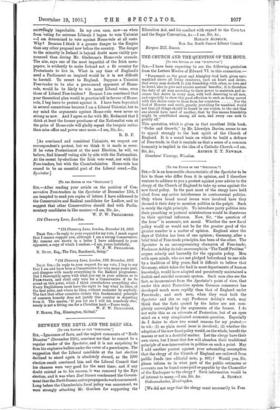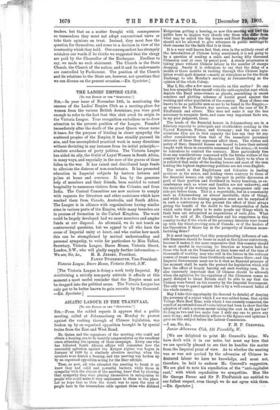[To THE EDITOR OP THE "SPECTATOR. " l SIR,—It is an honourable
characteristic of the Spectator to be fair to those who differ from it in opinion, and I therefore venture to address to you a protest against your advice to the clergy of the Church of England to take up arms against the new fiscal policy. In the past most of the clergy have held aloof from any active interference in controversial politics. Only where broad moral issues were involved have they deemed it their duty to mention politics in the pulpit. Such is surely the right principle. To introduce party politics into their preaching or pastoral ministrations would be disastrous to their spiritual influence. Now, Sir, " the question of the hour" is economic, not moral. Whether the new fiscal policy would or would not be for the greater good of the greater number is a matter of opinion. England since the days of Cobden has been of one opinion; Germany, after a brief trial of Free-trade principles, has been of the other. The Spectator is an uncompromising champion of Free-trade; Professor Ashley (to take an example) in "The Tariff Problem" argues soberly and learnedly for the opposite policy. Men with open minds, who are not pledged beforehand to one side by a tradition of fifty years, find it difficult to believe that Germany, which takes the lead in most departments of human knowledge, would have adopted and persistently maintained a foolish and suicidal economic system. Such men also see the fact, so inconvenient from the Spectator's point of view, that under this strict Protective system German commerce has developed much more rapidly than that of England under Free-trade ; and such men, when they read both the Spectator and (let us say) Professor Ashley's work, may think that the facts quoted by the latter are not com- pletely outweighed by the arguments of the former. I do not write this as an advocate of Protection, but of an open mind on a very complicated economic question. Especially do I desire to show two sound reasons for my protest,— to wit: (1) no plain moral issue is involved ; (2) whether the adoption of the new fiscal policy would, on the whole, benefit the masses or not is a doubtful matter. Let the clergy have their own views, but I trust that few will abandon their traditional principle of non-intervention in politics on such a point. May I add another protest against your astounding assumption that the clergy of the Church of England are endowed from public funds (see editorial note, p. 907) ? Would you, Sir, please inform us in what part of the public estimates or accounts, can be found sums paid or payable by the Chancellor of the Exchequer to the clergy P Such information would be of interest to many.—I am, Sir, &c. A. SLOMAN. Godmanchester, Huntingdon.
[We did not urge that the clergy must necessarily be Free traders, but that on a matter fraught with consequences so tremendous they must not adopt conventional views or take their opinions on trust. Instead, they must face the question for themselves, and come to a decision in view of the trusteeship which they hold. Our correspondent has strangely mistaken our words if he thinks we suggested that the clergy are paid by the Chancellor of the Exchequer. Needless to say, we made no such statement. The Church is the State Church, the Church of the nation, and it and its endowments are controlled by Parliament. The position of the Church and its relations to the State are, however, not questions that we can diecuss on the present occasion.—ED. Spectator.]



















































 Previous page
Previous page